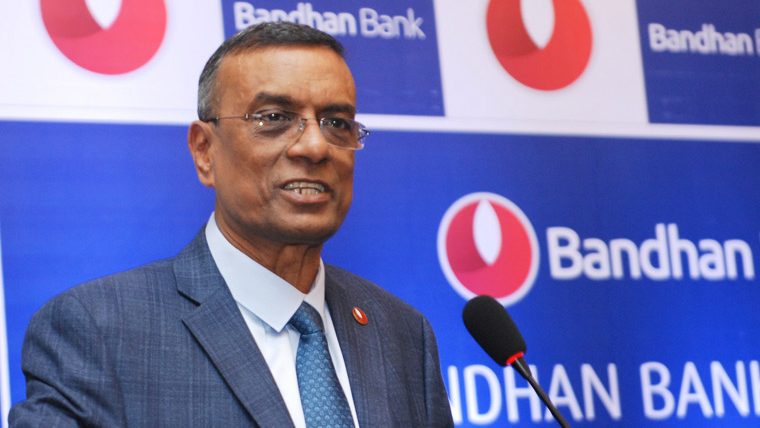“I am neither an economist, nor a banker. I am a pure NGO worker…” wrote Chandra Shekhar Ghosh, CEO, Bandhan Bank, in his resignation letter to the board of directors on Friday.
Many would agree. Ghosh’s career was largely shaped by the struggles in the initial years when he worked in the family’s sweet shop in Agartala, Tripura. Having seen the machinations of local money lenders who charged
usurious rates at an early age, Ghosh has been one of the foremost proponents of financial inclusion in India.
After working at BRAC, Bangladesh’s largest non-government organisation (NGO), Ghosh worked with several NGOs after coming back to India, before setting up Bandhan Bank over two decades ago.
In 2001, Bandhan started as a society to promote financial inclusion and women empowerment by extending small business loans. But cash was tight, forcing Ghosh to take a loan of `2 lakh from family members to hire his original team of three-four members who worked out of his home.
After setting up offices in Dunlop and Dakshineswar, Bandhan received a non-banking finance company (NBFC) licence in 2006 and started “Bandhan Financial Service”.
Bandhan Financial Service went on to become the largest NBFC-micro finance institution within the next five years.
Ghosh’s big moment came in April 2014 when the Reserve Bank of India (RBI) gave an in-principle approval to Bandhan to transition to a universal commercial bank. The bank started full-fledged banking operations from August 23, 2015.
“It was a surprise for everyone in the banking industry when Bandhan got a banking licence. The RBI had received 25-odd applications, including those from large corporate houses for universal bank licences. Coming from a NBFC-MFI setup from West Bengal, getting the banking licence was very rare,” a veteran banker said.
Performance under Ghosh
Over the past decade, Bandhan Bank’s overall deposits and advances have risen at the pace of 35% and 29% compounded annual growth rate (CAGR) over the last eight years to `1.35 trillion and `1.15 trillion as on March 2024, respectively.
The bank’s net profit over the past seven years has grown at the rate of 35% and stood at `2,195 crore in FY23.
Its physical branches grew at a 12% CAGR over the last seven years and stood at 1,411 as on FY23 end, whereas net interest margin has reduced from over 11% in FY16, when the bank commenced operations, to 7.21% as on
FY23 end, as the lender diversified its portfolio to increase the share of secured assets in its overall
loan book.
However, the Covid-19 period saw the bank slip. Its gross non-performing asset (GNPA) ratio rose from 1.48% in FY20 to 6.81% in FY21. GNPAs have slightly moderated to 6.46% in FY22 and 4.87% as on FY23 end, but stayed above peer private banks’ portfolio, largely due to the volatile asset cycles in the MFI segment.
As a result, Bandhan Bank’s shares have suffered. After listing on March 27, 2018, at `499 per share on the NSE, the shares hit a high of `526 per share by FY19 end. However, post the Covid blow, the stock price has languished and currently trades at 184.95 per share.
Untimely exit?
The core worry of investors after Ghosh’s exit is the fact that the lender’s board had in November 2023 approved the reappointment of Ghosh for a period of three years. While there was no formal or direct communication by RBI to the bank on Ghosh’s tenure extension plea, he said that he was contemplating resigning from the post from at least a year ago.
According to Jefferies, while Bandhan Bank’s growth has been improving and overdue loans are declining, slippages remain a constant and recovery of claims made under the Credit Guarantee Fund for Micro Units (CGMFU) is pending and being investigated by EY and the National Credit Guarantee Trustee Company.
Further, several senior level exists have also spooked investors of the bank.
“Against this backdrop & given Mr Ghosh’s long stint as the founder-CEO of the bank, and more importantly, the leader for micro-financing business, we see this event as a risk from execution and strategy perspectives,” Jefferies said in a note.
In a conference call on Monday, Ghosh clarified that the decision to retire at the end of his current term till July 9, 2024, was voluntary and personal. At 64, many would say, it’s a bit too early.


